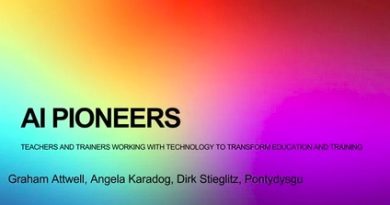Month: December 2022
Open AI’s ChatGPT application


There has been a lot of excitement over the OpenAI release of ChatGPT, not least within the education community. And playing with it makes it easy to see why. It’s a very, very well-designed tool. Although it’s important to say it has its failings, not least an inability to tell truth from falsehoods. I can’t keep up with the many articles and news reports about the application although I certainly think that for those of us who have for some time been talking about the coming of AI, at least now everyone seems to be getting the message.
And finally, people are starting to worry about the implications of data and machines for Assessment. More to come on this.
If you have not already go ahead and give ChatGPT a try. It is very easy to sign up for a free account.
See below for a short conversation I has with ChatGPT about the skills and competences teachers and trainers need to use AI in education and training
Me: Can you tell me what skills and competences teachers and trainers need to use AI in education and training
ChatGPT: There are several skills and competences that teachers and trainers should possess in order to effectively use artificial intelligence (AI) in education and training. These include:
- Technical skills: Teachers and trainers should have a basic understanding of AI concepts, such as machine learning, natural language processing, and data analysis. They should also be familiar with the tools and software that are commonly used for AI development, such as Python and TensorFlow.
- Pedagogical skills: Teachers and trainers should have a strong understanding of the learning theories and pedagogical approaches that are most effective for their students and learners. They should be able to use AI to enhance, rather than replace, traditional teaching methods.
- Creative problem-solving skills: Teachers and trainers should be able to think creatively and come up with innovative ways to use AI in education and training. They should also be able to troubleshoot technical problems that may arise when using AI tools.
- Communication skills: Teachers and trainers should be able to clearly and effectively communicate the concepts and applications of AI to their students and learners. They should also be able to explain the ethical implications of AI in education and training.
- Interpersonal skills: Teachers and trainers should be able to work effectively with their students and learners, as well as with their colleagues and stakeholders. They should be able to foster a collaborative and inclusive learning environment that is conducive to using AI.
Me: Can you design me a curriculum for teaching teachers and trainers how to use AI in their practice
Chat GPT: Sure, here is a sample curriculum for teaching teachers and trainers how to use artificial intelligence (AI) in their practice:
- Introduction to AI: This module would provide an overview of AI concepts, including machine learning, natural language processing, and data analysis. It would also cover the history and current state of AI, as well as its potential applications in education and training.
- AI tools and software: This module would introduce teachers and trainers to the tools and software that are commonly used for AI development, such as Python and TensorFlow. It would provide hands-on experience with these tools through exercises and projects.
- Pedagogy and AI: This module would explore the learning theories and pedagogical approaches that are most effective for using AI in education and training. It would cover best practices for integrating AI into lesson plans and curriculum, as well as strategies for assessing student learning with AI.
- Ethical considerations in AI: This module would address the ethical implications of using AI in education and training, including issues such as bias, privacy, and transparency. It would also provide guidance on how to address these issues in practice.
- Case studies and projects: This module would provide opportunities for teachers and trainers to apply their knowledge and skills in using AI in education and training through case studies and projects. This could include designing and implementing AI-based lesson plans or creating AI-based assessments.
- Reflection and professional development: This module would provide opportunities for teachers and trainers to reflect on their learning and experiences with using AI in education and training. It would also provide guidance on ongoing professional development in this area.


